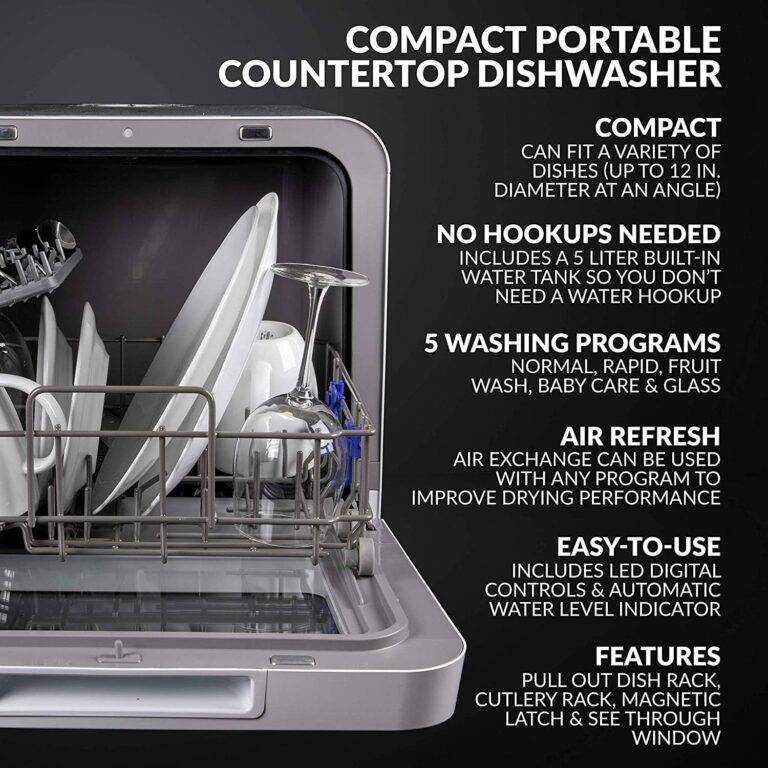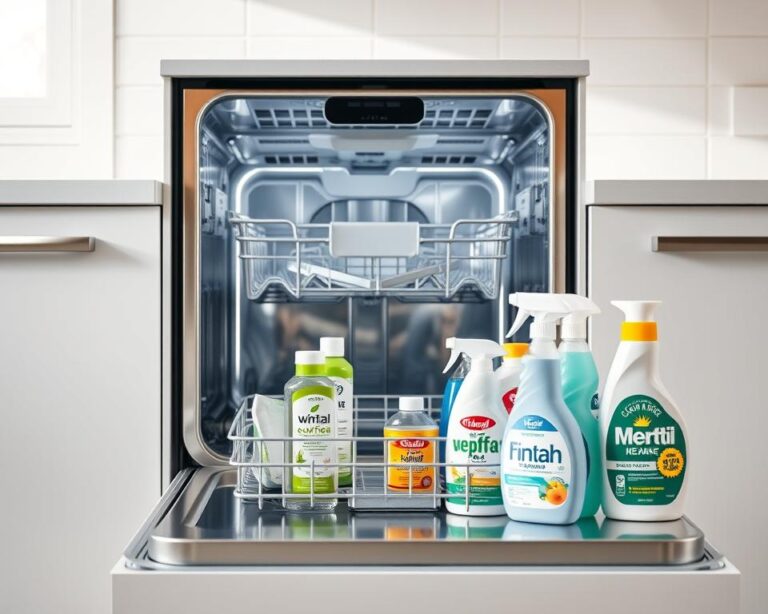Maintaining a fresh scent in your dishwasher is crucial for ensuring that your kitchen stays inviting and odor-free. Dishwashers, while designed to clean, can develop unwanted odors due to various factors, from leftover food particles to grease buildup. Utilizing an effective dishwasher deodorizer is an essential step in combating these smells. By implementing regular cleaning routines and exploring the best dishwasher deodorizer options, you can keep your appliance smelling fresh and functioning optimally. Plink® Washer & Dishwasher Freshener & Cleaner, for instance, is noted for its ability to effectively eliminate foul odors while also ensuring cleanliness when used weekly1. Additionally, the ACTIVE Dishwasher Cleaner, available in a convenient value pack for a whole year, provides its users with a concentrated formula that targets grime and odor-causing residues2. In this guide, we will delve into detailed tips and solutions that will help you maintain a fresh-smelling kitchen essential.
Understanding Dishwasher Odors
Unpleasant smells emanating from your dishwasher are often due to a buildup of old food and grease. These odors are not merely annoying; they can signal underlying issues with your appliance. Leftover food particles can collect in hard-to-reach places, resulting in bad dishwasher odors as the organic matter decomposes3. A malfunctioning drain hose can exacerbate the problem, allowing residual water to stagnate, which ultimately leads to unpleasant scents3.
To effectively combat these odors, routine maintenance becomes essential. It is recommended to clean the drain filter at least once a month to prevent the accumulation of food waste and blockages4. Having a clear filter helps ensure that no food remnants contribute to bad smells. Regularly wiping down the interior of your dishwasher every two to three weeks can help prevent soap and gunk buildup4.
Many individuals tend to overlook the importance of deodorizing their dishwashers, with statistics showing that 20% of Americans admit to never cleaning their dishwasher4. Utilizing a dishwasher odor eliminator, such as baking soda or white vinegar, can significantly help in maintaining freshness4. Making deodorizing part of your routine—ideally once a month or whenever you detect an odor—can contribute greatly to a better dishwashing experience.
Common Causes of Dishwasher Smells
Understanding the causes of dishwasher odors can significantly enhance your dishwasher’s performance. A dirty filter is often the main culprit behind unpleasant smells, making regular cleaning of the filter an effective prevention measure5. Grease build-up can also contribute to unwanted odors, so implementing dishwasher cleaning tips like using a cleaner regularly can be beneficial5. Mildew thrives in the warm and damp environment of a dishwasher, and neglecting the cleaning of gasket seals can lead to increased unpleasant smells5.
Many American households face the issue of hard water, which can result in limescale and mineral deposits forming within the appliance6. Standing water is another common reason for sewage odors, making it essential to check your drainage systems to prevent water accumulation5. Cleaning products like Affresh® dishwasher cleaner are specifically designed to eliminate these odors and maintain a fresh environment6. Regular cleaning and maintenance of your dishwasher can greatly reduce these lingering smells and help improve overall cleaning efficiency7.
Importance of Regular Dishwasher Maintenance
Engaging in regular dishwasher maintenance is crucial for ensuring that your appliance functions optimally and provides sparkling clean dishes. Regular cleaning extends a dishwasher’s lifespan, potentially saving money on repairs or replacements down the road8. A clean dishwasher operates more efficiently, using water and energy effectively, which leads to better overall performance8.
Implementing the best practices for dishwashers includes a routine cleaning schedule that tackles specific areas prone to issues, such as filters and seals. Dishwasher filters should be cleaned once a week to maintain optimal performance9, while daily upkeep can take only 1-2 minutes, making it easy to incorporate into your routine. Monthly deep cleaning, which includes running an empty cycle with vinegar, is recommended for thorough maintenance9.
Additionally, neglecting regular maintenance may lead to fouler odors and even appliance breakdown due to clogged components. Installed spray arms can perform poorly when food particles or mineral deposits accumulate, diminishing cleaning power8. By taking a few minutes each week to maintain the dishwasher, you can prevent bacteria and mold growth, creating a more hygienic environment for your kitchen8.
Incorporating simple practices, like leaving the dishwasher open after a cycle, can help prevent further issues such as mold buildup9. Ultimately, prioritizing regular dishwasher maintenance promotes efficiency and hygiene while extending the lifespan of your appliance, ensuring that it continues to serve you well for years to come.

How to Get Rid of Dishwasher Smell
Learning how to get rid of dishwasher smell can enhance not only the cleanliness of your kitchen but also your overall dishwashing experience. One recommended method is to utilize household staples like white vinegar and baking soda. Begin by removing the dishwasher filter and cleaning it thoroughly, as this part often traps food particles and can lead to unpleasant odors1011. Regular maintenance of the filter is key; it should be rinsed at least once a month11.
A simple yet effective cleaning cycle can be achieved by placing a cup of vinegar in a dishwasher-safe container on the top rack and running a hot water cycle. This approach helps neutralize odor and break down grease buildup10. Some users also prefer to combine half a cup of baking soda with a cup of vinegar, creating a potent mixture that enhances the cleaning process11.
It’s wise to avoid using bleach in dishwashers due to its corrosive effects, which can damage components over time10. Instead, consider using specialized dishwasher cleaners like Cascade, which are designed to combat limescale and inhibit odor formation10. For effective cleaning methods, aim to run this process at least every three to four months10.
To prevent future odors, ensure that dishes are pre-rinsed before loading them, and run the garbage disposal before starting the dishwasher. Overfilling the dishwasher can impede proper washing, so maintain space for optimal water flow12. Employing these strategies will significantly improve the smell and efficiency of your appliance.
DIY Solutions: Effective Dishwasher Deodorizer
Many households encounter unpleasant odors from their dishwashers, and the good news is that effective DIY deodorizing solutions can be made using natural ingredients. Cleaning experts stress the importance of regular maintenance, as accumulated debris can lead to these odors, highlighting the effectiveness of a natural dishwasher deodorizer using items already in your pantry. A simple mixture of vinegar and baking soda serves as an effective blend to tackle stubborn smells safely13. This combination not only helps eliminate odors but also ensures that your dishwasher remains in optimal condition.
To create your own deodorizer, start by sprinkling a cup of baking soda into the bottom of the dishwasher. Next, pour a cup of white vinegar into a dishwasher-safe bowl and place it on the top rack. Run a hot water cycle to allow the two ingredients to interact, effectively neutralizing odors13. For ongoing maintenance, it is advisable to clean your drain filter periodically, especially as clogged filters can contribute significantly to unpleasant smells14.
Using fresh lemon juice is another fantastic option. Adding a few slices or a cup of lemon juice to the dishwasher before running a hot cycle can drastically improve the scent, making it an ideal DIY deodorizing solution. This natural approach not only helps prevent odors caused by food residues, such as fish or eggs, but also leaves your dishes smelling fresh14.
Choosing the Best Dishwasher Deodorizer Products
Selecting the best dishwasher deodorizer products will help maintain a fresh and clean appliance. Numerous options exist, and understanding their effectiveness is paramount. For example, nearly 28,000 reviewers give Affresh Dishwasher Cleaner five stars, making it a popular choice among users15. This product comes in a quantity of six powder tablets, allowing for six uses16.
Among the top-rated dishwasher deodorizers, Finish Dual Action Dishwasher Cleaner stands out, particularly in areas with hard water, where it has received positive reviews15. It also provides a liquid option of 8.45 ounces for one use, which can be quite effective16. Lemi Shine Dishwasher Cleaner has reviewers declaring it works like magic for stains and odor removal, further illustrating the range of options available.
When considering product effectiveness, Cascade Platinum Dishwasher Cleaner Pods have nearly 80% of reviewers giving a five-star rating, showing strong approval15. Another viable option, the Glisten Dishwasher Cleaner & Disinfectant, is praised for its ability to combat hard-water stains in stainless-steel dishwashers. Meanwhile, Oh Yuk Dishwasher Cleaner has received feedback pointing to significant stain reduction and sometimes even complete removal15.
Furthermore, Aunt Fannie’s Extra Strength Cleaning Vinegar provides 24 uses in a gel cleaner format, showcasing versatility in your choices16. True Fresh Dishwasher Cleaner and Deodorizer Tablets come in 18 powder tablets for a significant number of uses, making them user-friendly16. Evaluating the quantity and effectiveness of these products will enable an informed choice, leading to a fresher dishwasher experience.
Cleaning Your Dishwasher Filter
Keeping your dishwasher running smoothly and odor-free starts with regular cleaning of the dishwasher filter. Experts recommend cleaning dishwasher filters every month to maintain hygiene and efficiency. This task can often be done in just 5 to 10 minutes, a small investment of time that pays off nicely in terms of performance and smell1718. Food particles tend to clog the filter, creating an environment for mold and bacteria that can result in undesirable odors1719. In some cases, people may need to clean the filter more frequently, with varying recommendations between once a year and every few weeks, depending on dishwasher usage18.
To clean the dishwasher filter, locate it at the bottom of the appliance. Gently remove it, ensuring no debris falls into the drain17. Rinse it under warm water and you may use a soft brush to eliminate stubborn particles. Avoid scrubbing it harshly, as this can damage the filter18. Besides cleaning the filter, checking the rubber door gasket for debris can prevent leaks and maintain overall performance18.
Regularly cleaning your dishwasher filter ensures that you are not only removing clogs from dishwasher but preventing future problems. Consider using natural cleaning agents like white vinegar and baking soda during your regular cleaning routine19. This approach helps remove minerals and grime that can build up, promoting a longer lifespan for your appliance. By adhering to these maintenance practices, you can keep your dishwasher in tip-top shape.
How to Clean and Maintain Spray Arms
Cleaning dishwasher spray arms plays a vital role in maintaining dishwasher performance. When these spray arms are blocked by food particles or grease, they will not be able to distribute water efficiently, resulting in poorly cleaned dishes. To begin cleaning, remove the spray arms from your dishwasher, which usually involves unscrewing or unclipping them. Fill a bowl with a solution of vinegar and baking soda, ideal for removing clogs and grime. Soak the spray arms in this solution for a few minutes, allowing it to penetrate any remaining debris.
After soaking, use a soft brush to scrub away any stubborn build-up, ensuring that the holes in the spray arms are clear. Rinse the arms thoroughly with warm water before reattaching them to the dishwasher. Regular maintenance is key; cleaning dishwasher spray arms once a month can prevent unpleasant odors and ensure optimal dishwasher performance2021. Remember, leaving the dishwasher door open for air circulation post-wash can further help reduce odors by allowing moisture to escape22.
To extend the lifespan of your dishwasher, pay attention to other components such as the filter. Cleaning the dishwasher filter every week is essential for maintaining efficiency20. Regularly scraping food from your dishes before placing them in the dishwasher will aid in reducing food accumulation, thereby enhancing the cleaning of spray arms. Emphasizing on maintaining these parts will contribute to the overall performance of your dishwasher.
Don’t forget to consult helpful guides and resources on efficient methods for cleaning dishwasher spray arms for more thorough instructions here.
Preventing Future Dishwasher Odors
To keep your dishwasher smelling fresh, routine cleaning is vital. Food particles can build up in a dishwasher over time, leading to unpleasant smells23. Regularly wiping down the door lip and seals helps prevent mold growth and persistent odors24. Consider implementing dishwasher maintenance tips such as checking and cleaning filters monthly to avoid clogs that can cause smells24. Avoiding overloading the dishwasher also plays a key role in preventing future odors, as it ensures dishes get cleaned thoroughly without trapping food residues.
Incorporating deodorizing routines can be beneficial. A vinegar and baking soda cycle is an effective way to tackle stubborn odors24. One tablespoon of baking soda and two tablespoons of vinegar poured down the drain can help eliminate odors23. Running an empty dishwasher with a mug of vinegar filled with 8 ounces for a full cycle can refresh the smell23. Consider commercial products like Dishwasher Magic or affresh for added freshness.
By following these dishwasher maintenance tips consistently, you can significantly reduce the chances of unpleasant odors. Regular cleaning of food debris from the bottom of the dishwasher and frequently wiping down the drain filter will also contribute to preventing future odors23.
When to Seek Professional Help for Your Dishwasher
If you’re facing persistent odors even after routine cleaning efforts, it may be time to consider a professional dishwasher repair. Some signs of mechanical failure such as unusual noises, failure to drain, or leaking water can indicate that your dishwasher needs expert attention. While many minor issues can be fixed with DIY solutions, complex problems often require skilled intervention to ensure proper resolution and avoid further damage.
In addition, if you notice clogged drainage issues that don’t resolve despite your best efforts—like using recommended dishwasher cleaners or descalers—this is another moment when to call for help. Thermador suggests descaling the dishwasher at least once a year to maintain optimal performance, and using their specialized dishwasher cleaner available at supermarkets can effectively tackle harder stains caused by mineral deposits and silverware contacts2526. Ignoring these signs may lead to greater costs down the road, making timely professional assistance a smart option.
Ultimately, knowing when to seek help can save both time and money. Keep an eye on your dishwasher’s function and don’t hesitate to reach out for professional service when you detect any issues that go beyond basic maintenance. After all, it’s better to act quickly than to face more serious damage that might require expensive repairs later on.
FAQ
What is the best dishwasher deodorizer to use?
The best dishwasher deodorizer can vary depending on personal preferences, but many users find natural options like vinegar and baking soda to be effective. For store-bought options, look for top-rated products that emphasize non-toxic and natural ingredients.
How can I get rid of a lingering dishwasher smell?
To eliminate lingering odors, start by thoroughly cleaning your dishwasher, focusing on the filter, spray arms, and door seals. Use natural deodorizing agents, like vinegar and lemon juice, and for stubborn smells, consider using an effective dishwasher deodorizer. Regular maintenance will also help in preventing future odors.
Can I use vinegar as a dishwasher deodorizer?
Yes, vinegar is a natural dishwasher deodorizer that can help neutralize odors. To use it, pour a cup of vinegar into the bottom of the dishwasher and run a hot water cycle. This method effectively eliminates smells while also cleaning the appliance.
How often should I clean my dishwasher to prevent bad smells?
It’s recommended to clean your dishwasher at least once a month to maintain its performance and prevent odors. Regular tasks should include cleaning the filter, spray arms, and door gaskets, as well as running a deodorizing cycle.
What are some common causes of dishwasher odors?
Common causes include food residue accumulation, clogged filters, mold growth, and grease buildup. Ignoring these issues can result in strong odors and inefficiency in cleaning performance.
Are there any non-toxic dishwasher deodorizers available?
Yes, there are many non-toxic dishwasher deodorizers on the market that use natural ingredients to eliminate odors. Look for products labeled as eco-friendly or biodegradable for the best results.
What DIY methods can help with dishwasher odors?
DIY methods include using baking soda, vinegar, and lemon juice. Simply place baking soda in the bottom of the dishwasher and run a cycle with hot water, or add vinegar during a wash cycle to help neutralize smells effectively.
When should I consider calling a professional for dishwasher issues?
If you have persistent odors despite cleaning, signs of mechanical failure, or drainage problems, it’s time to seek professional help. Some issues may be beyond DIY solutions and require expert attention.



